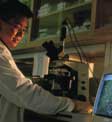 Connecting
the dots Last year, he started a study of 48 men taking 300 micrograms of selenium tablets daily to see what effects it has on their metabolism, including sperm motility and thyroid function. The two-year study ends in 2002. In the meantime, Hawkes is working with Ralph deVere White, director of the UC Davis Cancer Center, to see how bodily fluid samples taken from these men might be used for future prostate cancer studies. He's also coordinating a pilot study of selenium's effectiveness in preventing cancer. A proposed nutrition, genomics and cancer project involving Hawkes, Ralph Green, chair of the pathology department at the UC Davis Medical Center, and Jim Felton, an expert in cancer prevention at Lawrence Livermore National Laboratory, is also in the works. The study will examine how nutrients affect gene expression, how changes in gene expression affect cancer and how different genes interact with each other. This is where the technology available at the UC Davis Cancer Center and Lawrence Livermore National Laboratory comes to the fore. Using a technique involving DNA microarrays, researchers can quickly screen the activity of thousands of genes at once.
Home |
Table of Contents |
To our Readers |
Building on Basics UC Davis Health System | © 2000, 2001, 2002 UC Regents. All rights reserved. |
Some studies show that high levels of selenium in the diet may affect male fertility. Above, Kenneth Wong, a researcher in Chris Hawkes' lab, uses a computer - aided - analysis instrument to study the motility and morphology of semen samples from volunteers in a USDA selenium study. |

